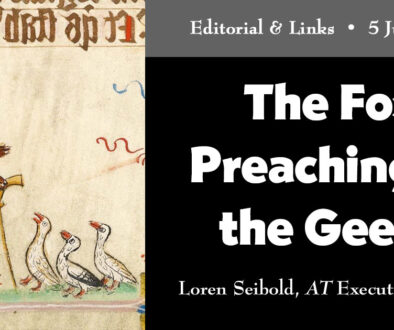I’m the Third Wife of an Adulterer. Am I Lost?
Dear Aunt Sevvy,
I’ve been married for over a decade. We’re in our 70s and are very happy together. My husband and I were both widowed.
However, my husband’s late wife was the woman he left his first wife and kids for. His first wife never remarried. For what it’s worth, my husband was not disfellowshipped when he committed adultery very publicly over 25 years ago.
Yet I realize that biblically, this makes me married to an adulterer. Am I doomed? I’ve been afraid to ask a pastor for fear of being disfellowshipped.
Signed, Worried Third Wife
Dear Third:
If there is one thing that has done more damage to Adventist families than anything else, it is the stupidities we have taught and enforced about divorce and remarriage.
There’s no doubt that your husband did something bad back then. He left broken hearts in his wake. But one of the key elements of the Bible’s teaching is that with confession and repentance and restitution, God can forgive sins—even ones as serious as infidelity.
As for your being married to him, Auntie can’t see how that affects your salvation. Yes, I know the equations we Adventists abstract from Jesus’ teachings about who did what to whom and when and for what reasons. But that is not an accurate expression of what Jesus taught, and to insist on following all the tangled strings back to their origin decades ago is the opposite of what Jesus said to people like the woman caught in adultery about leaving the past behind and starting over.
Which is to say, you are not culpable for your husband’s past infidelities, and if he has repented and confessed, neither is he—with one caveat that I will mention below.
Let’s take a moment to look at what Jesus said about divorce and remarriage. The reasons for the statement about marrying a divorced person have to do with the culture to which he spoke, where men could divorce at will and women and children were entirely unempowered. Adventists have treated this as an arbitrary rule. But Jesus never made arbitrary rules: he always had a reason, a principle. Whatever the cultural context that made him word it as he did, here’s what’s clear: it is wrong to divorce on a whim, and people should work to keep families together. This is reinforced by the statement that “what God has joined together, let no man put asunder.”
But that does not mean, as some Adventists have taught, that once people are married they must endure the hell of a horrible coupling for the rest of their lives. Because while no man can put asunder what God has joined together, God can put it asunder, and there is no doubt that he does, since even under the conservative Hebrew system divorce was allowed (Deuteronomy 24:1-4). Even if divorce occurs and even if infidelity is the reason, God can forgive, providing the sinner repents, seeks forgiveness from the one he wronged, and fulfills his responsibilities.
I mentioned one caveat, and here it is. If a man leaves his family, and then doesn’t take care of them by paying child support and doing his part as a father, he hasn’t understood the meaning of Jesus’ warnings against divorce. God can put asunder a miserable marriage. He can’t put asunder, as far as Auntie can see, one’s making his family live as widow and orphans. If Auntie were a pastor, those are the matters about which she’d question a divorced person—not merely about the algebra of who was unfaithful and who divorced whom and who got remarried. In other words, it’s not just whether you’re divorced. It’s whether you’re responsible.
So put aside your fears, and enjoy your marriage.
Aunt Sevvy
 Please write to Aunt Sevvy at DearAuntSevvy@gmail.com. Keep questions or comments short. What you send us won’t necessarily be, but could be, published—always without identifying you. Aunt Sevvy writes her own column, and her opinions aren’t necessarily those of Adventist Today’s editors.
Please write to Aunt Sevvy at DearAuntSevvy@gmail.com. Keep questions or comments short. What you send us won’t necessarily be, but could be, published—always without identifying you. Aunt Sevvy writes her own column, and her opinions aren’t necessarily those of Adventist Today’s editors.




